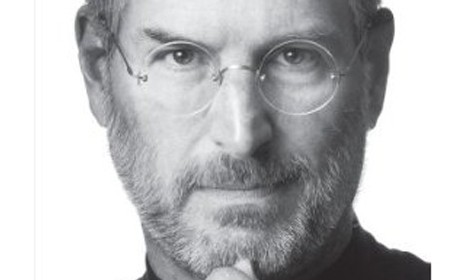The new Steve Jobs biography: 7 revelations
Walter Isaacson's anticipated book details just how much Jobs hated Google, how he tried to help Obama, and how he found inspiration in a Cuisinart

A free daily email with the biggest news stories of the day – and the best features from TheWeek.com
You are now subscribed
Your newsletter sign-up was successful
Steve Jobs, Walter Isaacson's hotly anticipated bio of the Apple guru, doesn't come out until Monday, but the media has already got its hands on the book. The notoriously private Jobs gave Isaacson unprecedented access, granting him over 40 interviews. Here, seven revelations leaked by the press:
1. He was really furious about Google's Android
Jobs said Google was guilty of "grand theft" when HTC released an Android phone that borrowed or approximated many of the iPhone's popular features. Apple promptly sued Google, in one of the early shots of the ongoing mobile patent wars. "I will spend my last dying breath if I need to, and I will spend every penny of Apple's $40 billion in the bank, to right this wrong," Jobs told his biographer in an "expletive laced rant." "I'm going to destroy Android, because it's a stolen product. I'm willing to go thermonuclear war on this." When former Google CEO Eric Schmidt, who also served as an Apple board member from 2006 to 2009 before quitting due to conflict of interest, tried to settle the lawsuit, Jobs told him, "I don't want your money. If you offer me $5 billion, I won't want it. I've got plenty of money. I want you to stop using our ideas in Android, that's all I want."
The Week
Escape your echo chamber. Get the facts behind the news, plus analysis from multiple perspectives.

Sign up for The Week's Free Newsletters
From our morning news briefing to a weekly Good News Newsletter, get the best of The Week delivered directly to your inbox.
From our morning news briefing to a weekly Good News Newsletter, get the best of The Week delivered directly to your inbox.
2. He regretted delaying cancer surgery
After being diagnosed with a rare type of operable pancreatic cancer in October 2003, Job delayed having surgery for nine months, instead adopting a vegan diet and trying alternative therapies. Years later, Jobs told Isaacson, with what his biographer notes was "a hint of regret," that "I really didn't want them to open up my body, so I tried to see if a few other things would work." In a 60 Minutes interview, Isaacson says, "He wanted to talk about it, how he regretted it... I think [at the time] that he kind of felt that if you ignore something, if you don't want something to exist, you can have magical thinking."
3. He thought he might die young
As a young man, Jobs suspected he wouldn't live to a ripe old age, telling John Sculley, Apple's onetime CEO who fired Jobs in 1985, that "none of us has any idea how long we're going to be here nor do I, but my feeling is I've got to accomplish a lot of these things while I'm young."
A free daily email with the biggest news stories of the day – and the best features from TheWeek.com
4. He wanted to help Obama — his way
"You're headed for a one-term presidency," Jobs told Obama when they met in the fall of 2010, insisting that the administration needed to be more business friendly. Jobs wanted to help create political ads for Obama in 2008 on par with Reagan's acclaimed "morning in America" spots, but clashed with Obama's chief strategist David Axelrod. Jobs was also frustrated by an overly fussy menu served at a White House dinner for innovative CEOs that he helped plan. The fare included a shrimp, cod, and lentil salad and a chocolate truffle dessert.
5. He had little respect for Bill Gates
Jobs once said of Gates: "He'd be a broader guy if he had dropped acid once or gone off to an ashram when he was younger." At another point, he said, "Bill is basically unimaginative and has never invented anything, which is why I think he's more comfortable now in philanthropy than technology. He just shamelessly ripped off other people's ideas."
6. He didn't always shower enough for corporate life
After Jobs and Steve Wozniak founded Apple in 1976, the young geniuses and their financial backers brought on Michael Scott to help run the company as CEO. According to Steve Jobs, Scott "was hired mainly to manage Jobs, then 22," and one of his first orders of business was trying to get Jobs to bathe more frequently, says the Associated Press. "It didn't work."
7. The Apple II was inspired by a Cuisinart
Though the legendary Apple II, released in 1977, was praised for its clean aesthetic, it was originally going to look much different, and far more complicated, with a Plexiglass cover, roll-top door, and metal straps. While Jobs was shopping in a department store, a Cuisinart food processor caught his eye, and he decided he wanted the computer's case to be made of molded plastic instead.
Sources: Associated Press, Business Insider, Huffington Post (2)
Editor's note: This article originally contained an error regarding the design of the Apple II. It has since been revised. We regret the error.
-
 Why are election experts taking Trump’s midterm threats seriously?
Why are election experts taking Trump’s midterm threats seriously?IN THE SPOTLIGHT As the president muses about polling place deployments and a centralized electoral system aimed at one-party control, lawmakers are taking this administration at its word
-
 ‘Restaurateurs have become millionaires’
‘Restaurateurs have become millionaires’Instant Opinion Opinion, comment and editorials of the day
-
 Earth is rapidly approaching a ‘hothouse’ trajectory of warming
Earth is rapidly approaching a ‘hothouse’ trajectory of warmingThe explainer It may become impossible to fix